The life of a hero of the Silvertown Explosion – firefighter Henry Vickers
It is always an honour when something you have written reveals more about one of life’s true heroes.
And today I am happy to share memories of one of the legends of the Silvertown Explosion a hundred years ago, sub-officer Henry Vickers.
Following publication of the latest in the Forgotten Stories series on the london’sroyaldocks.com website, and on my website, I was contacted by one of Mr Vickers’ great-grandchildren, Dr Robin Hargadon, who lives in Canada.
She was in Newham two weeks ago to mark the centenary of the disaster. Dr Hargadon tells the family’s story…
She told me: “Hello Mr Grainger I am a Canadian and just returned from London, where I travelled with other members of my family to mark the centenary of the Silvertown Explosion.
“My great grandfather, Henry Vickers, was killed that day and my grandmother, Hilda Tickell, was in the family home when it fell all around her – she always said that the only reason she survived was because she was pulled under a table by a friend of her father’s who was visiting.
“She was nearly 20 years of age. We attended the event at St. Luke’s Community Hall in Canning Town and I was able to get to the gathering at the Royal Wharf site toward the end of the evening. By that time, most guests had left but I did meet Sir Hugo Brunner on his way out.”
Robin now tells the story of hero Henry Vickers.
*Sub officer Henry Vickers
“Henry Vickers was born in Lincolnshire in 1868 to parents, Charlotte and John Vickers. He left home in his early teens, working on a cargo vessel as a Cargo Boy, leaving from Hull. By the time he was 16 or 17, he had travelled around the world by ship. He ultimately served with the Merchant Navy. Apparently, naval experience was compulsory to become a firefighter in London, up until the 1890’s.
“ It appears that he served with the Metropolitan Fire Brigade for many years, and then moved to the West Ham Fire Brigade in 1893. He was living at a group residence of the Fire Station when he married Annie Elize Deboise, a Huguenot descendant, in 1895.
“Annie was described as a tall, attractive red head with musical gifts for playing piano and singing. Henry and Annie had two children, William Henry (born in 1896) and Hilda Maude (born in 1897). My grandmother (Hilda) recalled hearing many tales of her father’s adventure seeking as a young man. She was clearly very fond of him.
“He had bought her a pomeranian dog for her birthday, one week before the explosion. In addition, she never forgot that she and her father had a ‘tiff’ the morning of the explosion and she would not say goodbye to him when he left for work. She never saw him again. For the rest of her life, she would not abide by parting in anger with a loved one. This guiding principle continues in the families of her descendants to this day.
“On January 19 1917, my grandmother returned home from work and a friend of her father’s was visiting at the house. She lived with her parents just down the road from the station. Her brother, known as Harry, was fighting in the Middle East. She recalled hearing the bell alarm at the fire station and then the siren as the truck left the station. There were two small explosions, followed by a big one. Her father’s friend dragged her underneath the dining room table.
- The scene of devastation at the factory
“The clock on the mantle stopped at about 6:50, according to her memory, roughly the time of the large explosion. She recalled walking out of the remains of the house through a hole in the wall. The upstairs was essentially demolished; all that remained was a bath tub at the top of the stairs, and parts of the staircase and chimney could not be reconditioned.
“The small Pomeranian dog was not seen again. She was in shock and wandered the streets for hours, looking for her mother who was visiting her mother on Ravenscroft Road, closer into London. Her clothing was in tatters, boots were cut by shrapnel and her face was blackened . She was not aware of her appearance for several hours. She recalled walking over dead bodies as she searched for her mother. They eventually were reunited.”
Robin said that her grandmother told us that her father was finishing his shift at the time of the alarm for the fire. Although he and his colleagues knew that there was little they could do to stop the fire when they arrived at the factory, they still tried to do whatever they could.
“Two of them, including my great grandfather, sacrificed their lives in service to the community. He was posthumously honoured for his bravery. The funeral was a large public event, attended by hundreds of people, lasting seemingly for hours, and officiated by the Bishop.
- Front page of the Daily Mirror covering the firefighters’ funeral
“My grandmother and her mother subsequently moved to Plymouth to live with Henry’s brother, his wife and daughter. My grandmother worked for the Admirality, and told stories of watching the ships leaving port at Plymouth, carrying hundreds of men to war. Unfortunately, the original living arrangement was uncomfortable for my grandmother and her mother as Henry’s brother was kind and welcoming to them, but was rather strident and harsh with his wife and daughter.
“After a few months, they decided to board with another family and this is where my grandmother met Nell, who was ultimately introduced to her brother Harry upon one of his visits home. Nell and Harry eventually married and had one son, Tony. My grandmother also met the brother of the man she would eventually marry (Horace Tickell); they first met when she visited him, along with his brother, after WWI when he was convalescing from injuries sustained during the war.
“My grandmother moved back to London, with her mother, three years later. In 1921, while working in London, she ran into a girl she’d know before the explosion who was surprised to see her, stating “I thought you were dead”. This comment made her feel “rather strange”.
“My grandmother married Horace Tickell in 1924 and my mother, Aileen, was born in 1925. Horace was an athletic man who worked in publishing. Unfortunately, he died of pericarditis at age 40 in 1936. My grandmother and mother lived through the Second World War in London, where my grandmother lost another home, this time to the Blitz Around the age of 17, my mother became a WREN with the British Royal Navy and met Kevin Hargadon, a Canadian Naval Officer, at a party on a ship in 1944. They were married on February 11, 1945.
“My mother was on the first plane to fly war brides to Canada (Montreal) following the war. My parents lived in Montreal, where my father attended McGill University to study Dentistry and my mother worked as a secretary for the dean of Engineering. It was not easy adjusting to life in Canada, and my grandmother left her life in England, at the age of 51, and moved to Canada to join her daughter and son in law. She lived with our family and helped raise her five grandchildren, including four grandsons and one granddaughter. She also worked outside of the home, on a full-time basis, until her early 60’s.”
Robin added: “When we were growing up, my grandmother spoke fondly of her father and his kindness, adventurousness and bravery. She could not stand parting ways without properly saying goodbye, nor did she like to be alone or to hear the rumble and crash of thunder.
“These features, I believe, all related to her personal experience of trauma and loss at the time of the Silvertown Explosion. Nonetheless, she led a happy life and remained sharp, witty and stoic until the end, passing away at nearly 97 years of age in November, 1993. She was a huge influence on the lives of her grandchildren and hence three of us will come to London, in addition to four of her great grandchildren, to honour her resilience, and the bravery of her father, at the time of the centenary of the Silvertown Explosion.”
Pictures: Newham Archives/ Colin Grainger / Newham Recorder ( the former Stratford Express )


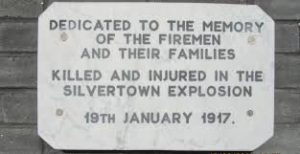
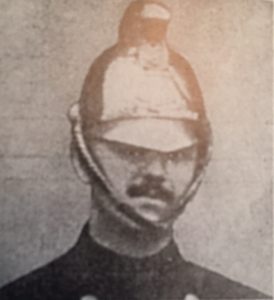
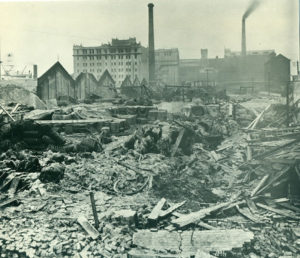
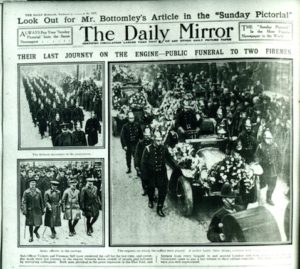
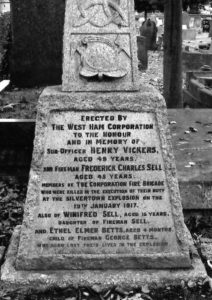
My Great Uncle was injured in that explosion, he lost the Back off both is Heels.
My granddad was a fireman and got a medal for his work with these fires.
I have his certificate. Charles Dearsley French
my mum’s bother was killed by a hit on the head from the explosion in sliver Town.